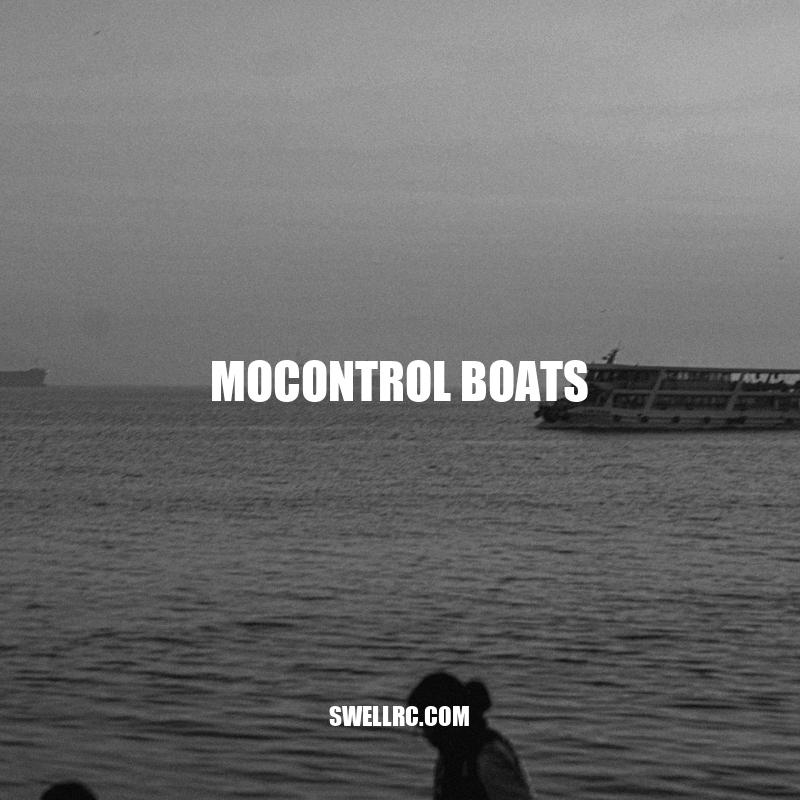RC Boats: A Comprehensive Guide
Remote control (RC) boats are miniature vessels that are powered by electric batteries, gasoline or nitro fuels, and are controlled from a distance by a handheld radio transmitter. These boats come in different shapes and designs, and their uses vary from racing to recreation. RC boats have been around for decades, but they’re now more popular than ever before, thanks to technological advancements that have made them more affordable and easier to operate. They offer a fun and exciting way to experience boating, without the expenses and maintenance required for full-size boats. With a variety of designs, sizes, and operating mechanisms, there’s an RC boat that is just right for every enthusiast. Whether you’re interested in leisure cruising, high-speed racing or performing stunts, there is an RC boat that suits both your desires and needs. In this article, we’ll explore the world of RC boats and provide you with insightful tips on how to choose, operate, and maintain an RC boat.
Types of RC boats
RC boats come in various types, each designed for specific purposes and operated using different mechanisms. Understanding the various types of RC boats will help you choose the one that best suits your needs. Some common types of RC boats include:
- Electric RC boats: these are powered by rechargeable batteries
- Nitro RC boats: these use nitro fuel
- Gasoline RC boats: these use gasoline as their fuel
- Scale RC boats: these models are designed to look like real boats, down to their smallest details
- Racing RC boats: these are smaller and more agile, designed for speed and maneuverability
When choosing an RC boat, you’ll want to consider its size, speed, and how it’s powered. Electric RC boats are ideal for beginners, as they’re easy to operate and maintain. Nitro and gasoline-powered RC boats are better suited for experienced enthusiasts, as they require more care, maintenance, and attention. If you’re looking for a RC boat to race, then you should consider getting a racing RC boat. Racing RC boats are designed to perform well at high speeds and can be optimized for quick turns and better maneuverability. Whatever your interest, there’s an RC boat that meets your needs and budget. You can find these boats on websites such as Amazon, HobbyTron, or eBay.
How fast do RC boats go?
RC boats can go from as little as a few miles per hour (mph) to over 100 mph depending on their size, type, and design. Here are some examples:
- Entry-level electric RC boats often have a top speed of 15-25 mph.
- Gas-powered RC boats can reach up to 50 mph.
- High-performance electric RC boats can go up to 60 mph.
- Hydroplane RC boats, designed for racing, can exceed 100 mph.
It’s important to note that the speed of an RC boat depends on several factors such as water conditions, wind, and maintenance. So it’s always advisable to follow the manufacturer’s recommendations and guidelines for optimal performance.
If you’re looking for RC boats, check out websites like Horizon Hobby, Tower Hobbies, and Amazon for a wide range of options.
Components of a RC Boat
Like any machine, RC boats are composed of various components that work together to make them function properly. Some of the key components of an RC boat include:
- Hull: this is the main body of the boat. It determines the boat’s stability, speed, and handling characteristics.
- Motor: this is the main power source of the boat. It determines how fast the boat will go and how long it will stay in the water.
- Propeller: this determines the speed and direction of the boat. Different propellers provide different performance characteristics.
- Radio transmitter: this is the device that allows you to control the boat. It sends signals from the controller to the boat, telling it what to do.
- Battery: this is the power source for electric RC boats. It provides the energy to make the motor and other electronic components work.
- Servos: these are small devices that control various parts of the boat, such as the rudder or sail.
It’s important to note that these components can vary significantly depending on the type of boat you have. For example, gas-powered boats may have a completely different motor setup compared to electric-powered boats.
Comparison table: Electric, Nitro and Gasoline RC Boats
| Feature | Electric RC Boats | Nitro RC Boats | Gasoline RC Boats |
|---|---|---|---|
| Power Source | Rechargeable battery | Nitro fuel | Gasoline fuel |
| Cost | Low to moderate | High | High |
| Speed | Slow to moderate | Moderate to fast | Fast |
| Maintenance | Easy | Requires regular maintenance and cleaning | Requires regular maintenance and cleaning |
| Noise level | Low | High | High |
It’s important to note that while electric RC boats may seem less powerful compared to gas and nitro-powered boats, they’re more environmentally friendly and easier to maintain. Ultimately, the choice of which type of boat to get depends on your preference and skill level. If you’re interested in RC boats, check out popular brands such as Traxxas, Pro Boat, and Horizon Hobby.
How does a remote control boat work?
A remote control boat works by using radio frequencies to communicate between the transmitter and receiver. The transmitter sends signals to the receiver on the boat, which then controls the various components of the boat, such as the motor, rudder, and speed controller. Remote control boats come in various types, including gas-powered, electric, and sailboats. They are popular for use in hobby and competitive racing. There are many websites and products available for purchasing remote control boats, with options for different skill levels and budgets. Some popular websites for purchasing remote control boats include Horizon Hobby, Amazon, and RC Boat Company.
Tips for First-Time RC Boat Users
If you’re a first-time RC boat user, here are some tips to help you get started:
- Choose the right RC boat for beginners: consider factors such as ease of use, stability, and durability when choosing your first RC boat
- Familiarize yourself with the boat’s controls and operation: read the user manual that comes with the boat and practice operating it on land before taking it to the water
- Proper battery charging and usage: follow the instructions provided with your battery to ensure it’s charged correctly and not overused, which can damage both the battery and the boat
- Safety precautions when operating RC boats: always wear life jackets, stay a safe distance from other boats, and avoid operating the boat in crowded areas
It’s also important to note that buying RC boats can be an exciting but expensive hobby. Some websites, such as horizonhobby.com and towerhobbies.com, provide a variety of RC boats at different prices, making it easy to find one that fits your budget and needs.
Overall, RC boats can provide hours of entertainment and excitement for people of all ages. With the right preparation, maintenance, and safety precautions, you’ll be well on your way to enjoying the thrills of this fun-filled hobby.
How did the first RC boat work?
The first RC boat was powered by a single motor that controlled its propeller. It was steered by a basic rudder mechanism located at the back of the boat. The motor was powered by radio waves transmitted from a control box onshore. The first RC boats were made in the 1950s and were expensive hobby items. Today, RC boats are much more affordable and offer a variety of features such as multiple motors, GPS navigation and even cameras. If you’re interested in purchasing an RC boat, check out websites like HorizonHobby.com or Amazon.com for a wide selection of models.
Maintenance and Repair of RC Boats
Just like any other mechanical device, RC boats require proper maintenance and occasional repair to keep them running smoothly. Here are some tips for maintaining and repairing your RC boat:
- Importance of regular cleaning and maintenance: always clean your boat after use to prevent corrosion and damage to the components
- Troubleshooting common problems in RC boats: some common issues include motor failure, broken propellers, and water infiltration, which can be identified and fixed with the help of user manuals or online forums
- Repairing minor damages in RC boats: minor damages such as cracked hulls or damaged servos can be fixed with epoxy or replacement parts, which can be purchased from online shops such as Amazon or RC Planet
- Seeking professional help for major repair works: for major issues such as water damage or complex motor problems, it’s best to seek help from professional boat repair shops, some of which can be found on websites such as Boats.com or Marine Services Guide
Taking proper care of your RC boat not only extends its lifespan but also ensures that you continue to enjoy the hobby without unexpected interruptions.
What maintenance does a boat need?
A boat requires regular maintenance to ensure it operates safely and efficiently. Here are some of the essential maintenance tasks:
- Check the hull for any damage or cracks, and repair them as necessary.
- Clean and maintain the propeller to avoid build-up of debris.
- Check and replace any worn-out or damaged lines and ropes.
- Perform regular oil and filter changes on the engine to keep it running smoothly.
- Inspect and replace the battery regularly, especially when it shows signs of corrosion.
- Check the boat’s electrical system, including lights and navigation equipment, for any faults.
Several websites, such as boats.com, offer guidance on maintaining various boat types. Products like marine-grade cleaning tools are available from retailers like West Marine, designed specifically for cleaning and maintaining all surfaces on watercraft.
Best Places to Use Remote Control (RC) Boats
RC boats can be enjoyed in a variety of different settings, depending on your preferences and the type of boat you own. Here are some of the best places to use your RC boat:
- In pools:
- In small lakes and ponds:
- In larger bodies of water such as rivers and oceans:
- In organized RC boat racing events:
Small electric or nitro RC boats can be used safely in indoor/outdoor swimming pools or backyard pools.
Parks, nature reserves, and recreational areas often have small bodies of water that are ideal for RC boats.
Larger RC boats such as gas-powered or scale boats can be used in bigger water bodies, provided local regulations regarding boating are followed.
Many hobbyists participate in RC boat racing events, which take place in specialized tracks or pools and are organized by local hobby shops or online communities.
Before using your RC boat in any public area, it’s important to ensure that you are following all local regulations and guidelines regarding boating, as well as being mindful of other people and wildlife in the area.
Some popular websites for finding RC boat races or connecting with other hobbyists include RCGroups.com and RCboatmag.com, which provides a wealth of information on the latest products, trends, and events in the RC boat world.
Can I use a RC boat in the sea?
Yes, you can use an RC boat in the sea, but there are certain things you need to keep in mind:
- Make sure your RC boat is designed for use in saltwater. Using a freshwater RC boat in the ocean can damage the motor or other components.
- Check weather and sea conditions before using your RC boat in the sea. Rough waters, heavy winds or tides can pose a risk of losing control over your boat.
- Ensure that the remote control has sufficient range to control your boat at the distance you plan to use it in the sea.
- Be considerate of others. Avoid using your RC boat near swimmers, surfers or other watercraft.
If you’re looking for a RC boat suitable for saltwater use, you may want to check out websites such as Amazon.com or Horizonhobby.com, which offer a variety of options at different price ranges.
Conclusion
RC boats can be a great way to enjoy the outdoors and immerse yourself in a fun hobby that combines engineering, technology, and leisure. Whether you’re a beginner or an experienced boater, there’s a type of RC boat that can fit your interests and skill level. By choosing the right boat, familiarizing yourself with its components and operation, and taking precautions when using it, you can create a fulfilling and safe experience on the water.
Moreover, the RC boating community is a passionate and supportive group of people, who are always happy to share tips, advice, and resources with each other. By joining online forums or attending local events, you can meet fellow hobbyists, learn new techniques, and form lasting connections that can enhance your experience with RC boats.
Overall, RC boats offer a fun and engaging way to explore your passion for boating and technology. By using the information shared in this article, you can get started on your journey as an RC boating enthusiast, and experience the joys and thrills of this exciting hobby.



